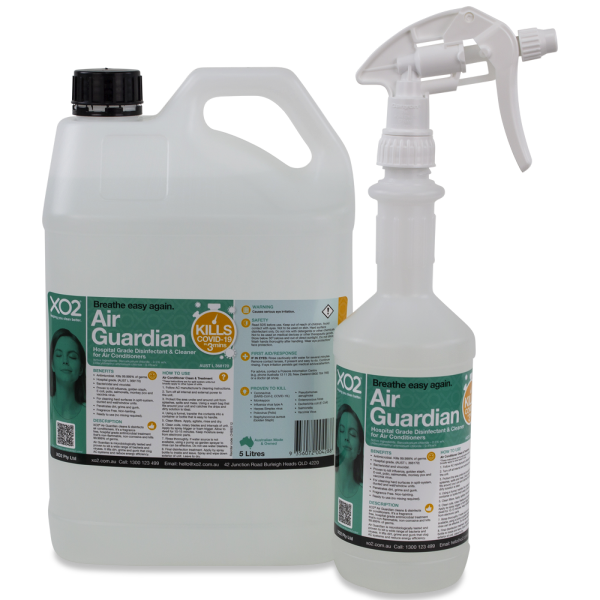Specifications for Air Guardian - Air Conditioner Disinfection Treatment & Cleaner, Hospital Grade TGA Listed
|
Size
|
750ml with Spray Trigger
or
5L
|
Is your air-con due for a clean and ‘disinfect-the-nasties’ treatment?
Air Guardian is Australia’s leading air conditioner disinfectant treatment and cleaner. It’s a fragrance free, hospital grade and TGA listed antimicrobial treatment that is non-flammable, non-corrosive and kills 99.999% of germs. The professional strength formula deeply penetrates and lifts dirt, grime and gunk that clog AC systems and reduce energy efficiency. Air Guardian is microbiologically tested and proven to kill a wide range of bacteria and virus’ including E-Coli, Salmonella, Influenza, COVID-19, Smallpox and Golden Staph. For better air quality, better health and lower energy costs… treat your AC with Air Guardian.
Where to use
Air Guardian can be used on split-system, ducted and wall/window air conditioning units. You can clean and disinfect vents, filters, coils, fan blades and internals. Air Guardian is also an ideal treatment for professionals servicing HVAC units.
Who loves Air Guardian?
Air Guardian is loved by air conditioning cleaning and sanitising experts, professional cleaners, homeowners and ‘clean air’ lovers.
The benefits
• Antimicrobial. Kills 99.999% of germs.
• TGA listed (AUST L 368170). Hospital grade.
• For split-system, ducted and wall/window units.
• Non-toxic. Non-flammable. Non-corrosive.
• Kills Golden Staph, E-Coli, Salmonella, Influenza, COVID-19, Polio, Smallpox and more.
• Penetrates dirt, grime and gunk.
• Fragrance free. Odourless. Non-tainting.
• No colour dyes added.
• Ready to use. No mixing required.
• Passes EN13727 Dirty Conditions Tests.
• No phenolics. No chlorine/bleach. No peroxide.
• Eco-friendly. 100% biodegradable.
• 100% cruelty free and never tested on animals.
• Australian made and owned.
Air Guardian is ready to use. Do not dilute. These instructions are for split system air conditioning units but broadly apply to other types of units.
Air conditioner clean and disinfection treatment
1. Check instructions. Follow the AC unit manufacturer’s instructions for cleaning at all times.
2. Turn off the power. Ensure no power is running to any internal or external part of your unit. Turn off any power points that the unit is plugged into. If possible, turn the power off at the main circuit board.
3. Protect the area under and around the unit from splashes, spills and mess. Using a wash bag that fits around your unit and catches the drips and dirty solution is ideal.
4. Clean filters. Apply, gently agitate, rinse and dry.
5. Clean coils, rotary blades and internals of unit. Apply by spray trigger or foam trigger. Allow to dwell for 10-15 minutes. Keep moisture away from electronic parts.
6. Rinse thoroughly. If water source is not available using a pump up garden sprayer to rinse can be effective. Do not use high pressure water blasters.
7. Final disinfection treatment. Apply by spray bottle to inside and leave. Spray and wipe down the exterior of unit.
Air conditioner disinfection only
1. Check manufacturer’s instructions.
2. Turn off the power.
3. Disinfect. Apply by spray bottle to coils, fans and internals. Leave to dry. Do not rinse. Spray and wipe down exterior of unit.
Handy hints
• Use caution when atomising disinfectants and decontamination treatments. Aspiration of disinfectants can cause respiratory problems. Use PPE.
• Organic soil inhibits disinfection. Thorough cleaning before disinfection will boost effectiveness.
• Not intended for use on medical devices or therapeutic goods.
Why clean and disinfect your air conditioner unit?
a. Better air quality. If not cleaned regularly, air conditioners can get blocked with dust, bacteria, pollen, mould, fungi, moisture, and skin cells. Clean air is important for health, especially for allergy sufferers.
b. Harmful bacteria and viruses. Treatment of air conditioners is critical in the control of bacteria and virus spread. Choosing a tested and proven treatment ensures the product will do what it says it does. Always ask for the TGA certificate and lab testing information if it’s not provided.
c. Lower power bills. A clean AC runs with better energy efficiency. Clogged filters and machine interiors make it harder for the machine to cool, heat, and move air. Clean coils can reduce fan motor workload by up to 30%.
d. Loved air conditioners will last longer… with fewer repairs, trouble, and cost.
How often should an air conditioning system be cleaned?
Here is the recommended maintenance schedule to ensure optimum air conditioner hygiene...
a. Weekly or fortnightly: It’s a good idea to run your system on ‘DRY’ mode every 1-2 weeks to reduce moisture buildup and help prevent mould and bad odours. This ‘DRY’ setting will work as a dehumidifier would.
b. Every 1-2 months: Wipe the down the exterior of your unit including the vents and ducts every 1-2 months. Give the inside a wipe where you can and spray treatment.
c. Every 4-6 months: Clean or replace the filters in the indoor unit. Follow the manufacturer’s instructions.
d. Yearly: Full clean and disinfection treatment of the complete unit.
Is Air Guardian self-rinsing or self cleaning?
It can be but we recommend rinsing all the muck away when you do your treatment. Rinsing does a much better job than letting the condensate clean away. Also, leaving chemicals on coils in an air conditioner that gets used can increase VOCs in the air which can be unhealthy and upsetting to the respiratory system.
Is Air guardian pet friendly?
Yes. When used as directed on air conditioners, it is safe for pets and humans.
Is Air Guardian septic safe?
Air Guardian is used in and around air conditioning units, therefore it does not ever make its way into a septic system. Therefore it is not applicable. However, Air Guardian is a hospital grade disinfectant designed to kill bacteria and virus', so you should not pour this sort of product into a septic system. Not that you would anyways :)



